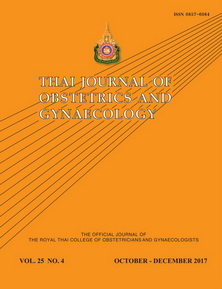Correlation between 50-gram Glucose Challenge Test and Neonatal Birth Weight
Main Article Content
Abstract
Objectives: To determine the correlation between the 50 gram glucose challenge test (50-g GCT) and neonatal birth weight.
Materials and Methods: The study comprised of 1879 women who underwent 50-g GCT at 24-28 weeks of gestation and delivered term infants. We determined the correlation between 50-g GCT by percentile and neonatal birth weight by using Pearson’s correlation. ROC analysis was used to determine the threshold of 50-g GCT for predicted low birth weight and macrosomia infants.
Results: The correlation coefficient between 50-g GCT by percentile and neonatal birth weight yielded a result of 0.885 (strong positive correlation). Using ROC analysis, 50-g GCT level ≥ 130 mg/dl predicted macrosomia infants with a sensitivity of 41%, specificity 72%, positive predictive value (PPV) 2% and negative predictive value (NPV) 99%. 50-g GCT level ≤ 105 mg/dl predicted low birth weight infants with a sensitivity of 40%, specificity 65%, PPV 6% and NPV 95% respectively.
Conclusion: There is a positive correlation between 50-g GCT and neonatal birth weight. 50-g GCT can be used as predictor for macrosomia infants and low birth weight infants.
Keywords: 50g glucose challenge test, neonatal birth weight.
Article Details
References
2. Rattarasarn C. The epidemics of diabetes and its impact on Thailand[Internet].2012[cited 2015 Nov 15]:30-1. Available from: http://www.dmthai.org/sites/default/files/briefingbook_38.pdf
3. The Royal Thai College of Obstetricians and Gynaecologists. Diabetic mellitus screening in pregnancy [Internet].2012[cited 2015 Nov 15]:169-84. Available from: http://www.rtcog.or.th/html/photo/newsfile_606544.pdf
4. Stamilio DM, Olsen T, Ratcliffe S, Sehdev HM, Macones GA. False-positive 1-hour glucose challenge test and adverse perinatal outcomes. Obstet Gynecol 2004;103:148-56.
5. Melamed N, Hiersch L, Peled Y, Hod M, Wiznitzer A, Yogev Y. The association between low 50 g glucose challenge test result and fetal growth restriction. J Matern Fetal Neonat Med 2013;26:1107-11.
6. Cunningham FG, Leveno KJ, Bloom SL, Spong CY, Dashe JS, Hoffman BL, et al. Williams Obstetrics. 24ed. New york: McGraw-Hill Education 2014.
7. Rosenn BM, Miodovnik M. Glycemic control in the diabetic pregnancy: is tighter always better? J Matern Fetal Neonat Med 2000;9:29-34.
8. Cekmez Y, Ozkaya E, Ocal FD, Suer N, Kucukozkan T. A predictor of small-for-gestational-age infant: oral glucose challenge test. Irish J Med Sci 2015;184:285-9.
9. Yee LM, Cheng YW, Liddell J, Block-Kurbisch I, Caughey AB. 50-Gram glucose challenge test: is it indicative of outcomes in women without gestational diabetes mellitus? J Matern Fetal Neonat Med 2011;24:1102-6.
10. Yesildager E, Koken G, Gungor AN, Demirel R, Arioz D, Celik F, et al. Perinatal outcomes of borderline diabetic pregnant women. J Obstet Gynaecol 2014;34:666-8.


